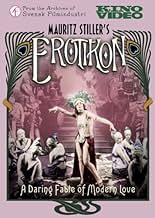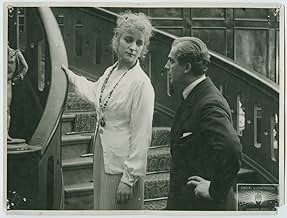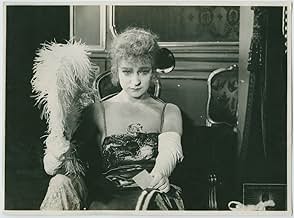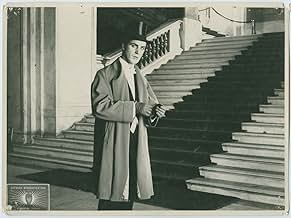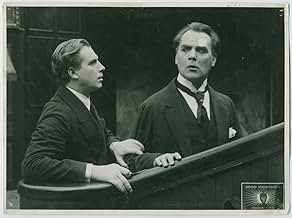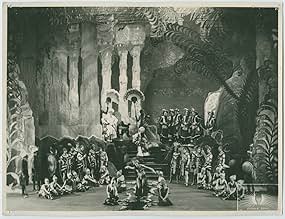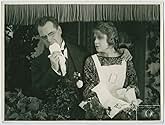EROTIKON surely pushed the boundaries of what was acceptable on the screen in 1920: Irene, the bored wife of a distracted entomologist, pursues a womanizing aviator, but she may actually be ... Read allEROTIKON surely pushed the boundaries of what was acceptable on the screen in 1920: Irene, the bored wife of a distracted entomologist, pursues a womanizing aviator, but she may actually be in love with Preben, her husband's best friend. Meanwhile, her husband seems to be getting... Read allEROTIKON surely pushed the boundaries of what was acceptable on the screen in 1920: Irene, the bored wife of a distracted entomologist, pursues a womanizing aviator, but she may actually be in love with Preben, her husband's best friend. Meanwhile, her husband seems to be getting unusually close with his own niece. Stiller obviously delights in teasing his audience wi... Read all
Featured reviews
The content of EROTIKON is seemingly simple and refers mostly to the relations, or better said 'inter-relations' among people. Yet, we have to realize that the film is being seen nowadays from the entirely different perspective with the entirely new vision of certain aspects. Naturally, even the things we expect in a comedy changed. Any silent film is, of course, being seen differently. When we consider the content regarding this very knowledge, EROTIKON occurs to be revolutionary, much ahead of its time. Stiller proves to be extremely open to modern thinking and, as a result, he becomes a milestone in the later trends in cinema. Certain notions on marriage, on the place of women in society, on the superiority of feelings to old, dusted regulations are particularly modern and appealing to an average movie buff nowadays. Here, the open minded thinking is so fresh, so unique, so absorbing though the film is, paradoxically, almost a century old. Why? Because EROTIKON is no preacher of what the things should be like but places the characters in the superior positions.
Since the characters make for the story, it is thanks to them that we enjoy the film. A few people are in the lead and...their emotions, desires, dreams seem to achieve their intensity and climax at the end. This is Professor Leo (Anders De Wahl). Most professors are famous for their researches and it depends, of course, what they research on...Leo's researches are quite peculiar...their subject are the beetles. He is a book buff, a calm man who loves very concrete schedule and takes life rather optimistically. Being naive in erotic tensions here and there, he skips certain desires around. Yet, he detests one thing: dramatic endings. His wife, Irene (Tora Teje) is a character worth consideration. She is a sort of prototype of a modern woman, independent of her husband, a woman who has a clear idea of what to do with life once giving a furrier a lesson of patience, another time traveling with a 'new Ikar' by helicopter, Baron Felix. Played by Tora Teje, she is given some marvelous moments of humor. Consider her waving at the husband or flirting scenes. Then comes a young, youthful, pretty, enthusiastic Marte (Karin Molander), a sweetie who loves sweets, a character who represents a light-hearted glimpse of a young girl: listening curiously to Professor's lecture on beetles' sexual life at the door, smoking a cigarette when the guests have left, making certain sensual moves meant to arouse men. She surprises us most at the end... Finally comes Preben (Lars Hanson), the best friend of the professor who has a crush on Irene...he appears to be fluent, more aware of life, sophisticated and burning within, burning with desire. Wonderfully portrayed by Lars Hanson, the actor who later became famous in Hollywood, the character of Prebel is very clear and memorable.
Those four characters supply us with wonderful tension that you will never forget. Their plots are so strongly linked to the strange fate of Shah and his wife in the Schaname that the opera sequence makes a perfect sense in the movie.
When seeing EROTIKON one may notice many other innovations, artistic features that played such a decisive role in Stiller's productions. For the director who had an unbelievable flair for beauty, the film could not come out with the lack of elegant wardrobe, wonderful sets, stunning visuals, catchy close-ups, fluent camera work and the technologically modern (for the time) stimuli like phones in a car and a helicopter. It all adds a certain amount of artistic pleasure and makes EROTIKON a valuable, enjoyable movie.
There is, moreover, one more aspect I would like to add when considering the artistic aspect. It is the great job done by Alva Lindbohm Lundin and the whole aesthetics and creativity in the subtitles. The pictures, created by her in the Svensk Filmindustrie, include birds chirping as the symbol of flirting or a question mark between the hearts symbolizing the dilemma who loves whom. These are just a few among the whole chain of wonderful ideas.
Some people will perhaps say that there are many elements of American cinema...true to a certain extent...like modern music often models upon immortal classical pieces, the same has occurred to happen in cinema...EROTIKON is a highly recommended film as an authentic presentation of certain aspects, as a tribute to feelings that should reign our acts, as the beautiful song "Jeg Elsker Dig" (I love you) that mysteriously showed the characters the paths they should take. A brilliant silent film!
Mauritz Stiller's movie should be familiar to film buffs who like Demille; the set-up is very much like the social comedies he was making at the time, minus the Christian ending and the lavish flashbacks -- although there is a sequence dropped in, in which they are all at the ballet watching a piece about a woman who wants to have a fling with her husband's best friend. The camerawork is not as lavish, but the editing is so good that the movie moves along smoothly, with never a bump when it takes an unexpected turn.
The ultimate unexpected turn is that it's all right. In the end, everyone still likes everyone else, but there's no message about this is the way things are supposed to be, forever and amen. Sometimes we make mistakes, and if we can fix them, everyone will be happier. Of course Stiller chooses his details carefully so his message is reinforced, but that's an artist's prerogative. He certainly has a movie here that, as de Wahl remarks, agrees with the movie-going public: a happy ending for all.
All that aside, this is a silent movie. Which while I have seen quite a few - it had been a while. So yes there is music, but all the dialog (well the dialog that is deemed necessary to be truthful) is being displayed on cards between scenes. Since it isn't an english movie the cards had subtitles ... I reckon I could have seen a version where they already had english cards ... but the streaming service that had the movie on did use the original cards. Just putting that information out there for those interested.
A strange movie in many respects. But an intriguing and intersting one, if you are able to take into account when this was shot ... and the context of that time and how much more it must have meant back then.
Did you know
- ConnectionsFeatured in Loin de Hollywood - L'art européen du cinéma muet (1995)
- How long is Erotikon?Powered by Alexa
Details
- Runtime
- 1h 46m(106 min)
- Color
- Sound mix
- Aspect ratio
- 1.33 : 1

